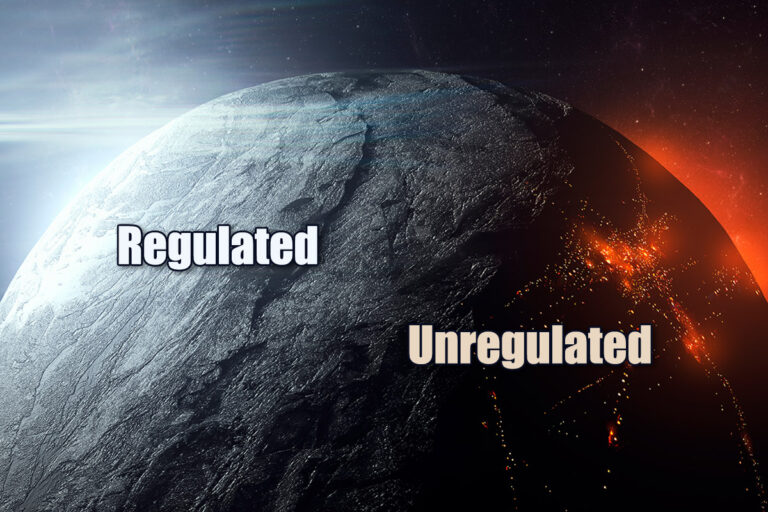
Data from a Penn State study supports the claim that fewer people bet illegally on offshore sites when local, regulated options are available. Diverting players from unsafe, illegal sites to comparatively safer regulated ones is one of the most common arguments for legalization. The university’s 2022 Online Gambling Report shows that far more Pennsylvanians now bet online legally than with black market sites.
The 28-page report from Pennsylvania State University examines the market and gamblers’ behavior from multiple angles. The comparison between regulated and offshore gambling is only one graph among many, but it’s an important one.
Some top-line findings from the study include:
- The typical Pennsylvanian online gambler is a white man in his late 30s with a bachelor’s degree and an income over $50,000.
- Roughly 11% of Pennsylvanians said they gambled online, 5% had ever felt they experienced a problem with it, and 1.7% had called the problem gambling helpline.
- Sports betting was the most popular form of online gambling, with 54% of online gamblers (6% of Pennsylvanians) having placed a bet.
Regulated Sites Far More Popular Than Offshore
Ignoring the 89% of adults in the state that didn’t gamble online at all, here’s the popularity of each legal online vertical among those that did:
- Sports betting: 54.0%
- Slots: 33.3%
- Fantasy sports: 31.9%
- Casino table games: 20.8%
- iLottery: 20.4%
- Poker: 15.6%
Unfortunately, we don’t know the number of overall casino players because Pennsylvania online casino regulations treat slots and table games separately. Depending on the overlap between slots players and table game players, it’s at least 33.3% and no more than 54.1%, but probably closer to the low end of that range.
By contrast, the percentage of players who’d played at illegal offshore sites was much lower. Only 13.3% said they had engaged in any form of offshore gambling. The percentages by product type show a very different pattern from the legal market:
- Sports betting: 2.3%
- Casino (slots or tables): 8.6%
- Poker: 3.6%
- Other: 1.5%
The American Gaming Association estimates that nationwide, just under half of people who gamble online do so illegally at times. This applies to sports betting and iGaming and includes those who use a mixture of legal and illegal sites.
Of course, nationwide statistics include many states without any legal online options and many more with online sports betting only. Pennsylvania is one of only six states where online casinos are legal. Even so, there’s a stark difference between its numbers and the national ones.
Some Forms of Offshore Gambling More Popular Than Others
What’s unusual about the numbers provided by the study is that the ratio of legal to offshore gambling is quite different depending on what product you look at.
54% of online gamblers engaged in legal sports betting, compared to just 2.3% who bet offshore. That’s a ratio of 23-to-1. If that was the case across the board, we could say that offshore gambling had been almost eradicated in Pennsylvania.
However, online poker has a 4.3-to-1 ratio of legal to illegal play in Pennsylvania. If we assume that most legal casino players are included among slots players, the online casino vertical also has about a 4-to-1 ratio.
There are a few likely reasons for this.
Legal Sports Betting Benefits From Marketing
Online gambling companies have been advertising their sportsbooks heavily. Some might even say too heavily.
Partly, that’s because sports betting is available in far more states than online casinos. The industry has also found that acquiring sportsbook customers is cheaper and easier than getting casino signups. Although casino games are the more lucrative product, operators target sports bettors, then attempt to cross-sell the casino product to them once they’re in the door.
That explains why sports betting is the most popular online product in Pennsylvania. By the same token, it explains why it’s having an easier time outcompeting the black market. The ability to advertise legally is one of the main advantages regulated operators enjoy over their offshore competition.
Offshore Casinos Target Problem Gamblers
Pennsylvania has statewide self-exclusion registries, including one for online gambling. Players who put themselves on the list can no longer play on any of the state’s regulated online gambling sites. Studies have found slots to be the highest-risk product for gambling problems, so the registry probably includes a high proportion of casino players.
Unfortunately, self-excluded players are a popular target for black market online casino operators, who don’t care about the harm they cause. Their sites cater to searches from players looking to circumvent their self-exclusions because someone with a gambling problem will likely lose a lot of money.
That may be why casino products are by far the most popular offshore vertical at 8.6% of Pennsylvania online gamblers.
Online Poker Needs Shared Traffic to Compete Effectively
Finally, Pennsylvania online poker sites are at a competitive disadvantage because the Keystone State has not yet joined the Multi-State Internet Gaming Agreement (MSIGA). This compact allows an operator to share traffic with its own sites in other states, meaning players in multiple states can play against one another.
That creates a larger overall player pool, making it easier to find a full table, and tournaments can offer bigger prizes. Currently, MSIGA includes:
- New Jersey
- Nevada
- Delaware
- Michigan
Of these, Michigan was the most recent to join, with PokerStars having dealt its first interstate hands at the beginning of this year.
There’s some hope that Pennsylvania could start the process to join this year. However, that depends on the Governor’s Office, which has remained mum on the topic.
In the meantime, some poker players choose to play on black market sites or use VPNs to try to mask their location and play on regulated international sites because of the larger player pools. The ratio of legal to illegal play in Pennsylvania would likely increase if the state were to join the MSIGA.





